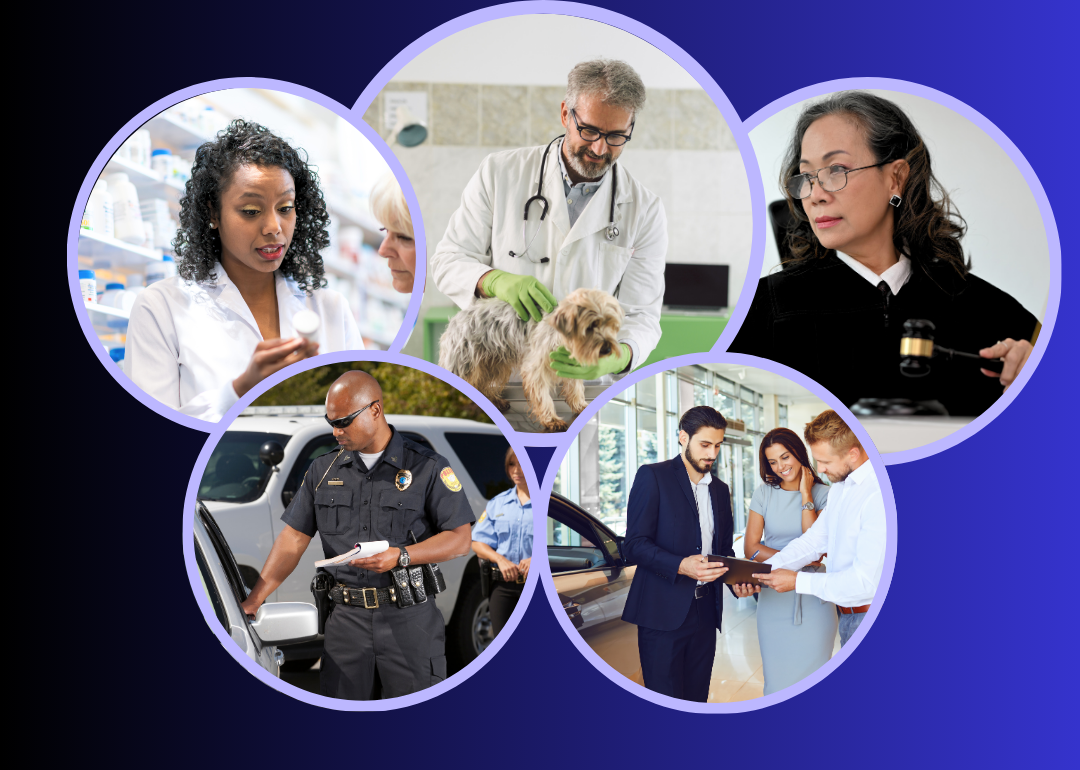
What's behind the declining trust America has in its nurses, police officers, and 21 other professions
What's behind the declining trust America has in nurses, police officers, and 21 other professions
In recent years, people's trust in individuals like doctors, teachers, and journalists has waxed and waned according to current events. According to Ipsos' 2024 Global Trustworthiness Index, however, that sense of trust has begun to grow once again—especially for those in certain careers.
Worldwide, doctors are ranked as the most trusted profession, followed by scientists and teachers. Meanwhile, politicians, other government members, and social media influencers ended up at the bottom of the list. Global respondents also reported having more trust in lawyers, bankers, and journalists than in past surveys.
That said, responses look very different here in the United States. Stacker analyzed Gallup survey data gauging how Americans viewed the honesty and ethics of 23 different professions. The data comes from a survey of about 800 U.S. adults that the research firm has conducted annually since 1990. Professions were then ranked based on the percentage of American survey respondents who said the profession had high or very high honesty and ethical standards.
In contrast to the 2024 global Ipsos analysis, Gallup's 2023 data showed a decline in Americans' trust in institutions like public education and the police, and even small businesses—which remained the most trusted institution—experienced a slight dip. Establishing trust with consumers through ethics and transparency is integral to a number of the professions the Gallup survey inquired about.
It's perhaps easier to understand Americans' cynical views of the federal government since public trust has been on the decline since the 1960s. However, the backslide in public trust in health care, legal, and financial professionals is more difficult to dissect. Read on to see just how much the opinions of each profession have shifted in recent years.

#1. Nurses
Public opinion of honesty and ethical standards:
- High or very high honesty and ethics: 78%
- 4-year change: -7 percentage points
It may not be surprising that health care workers top the list of most trusted professions, as trust is foundational to providing health care to vulnerable populations. Nurses, however, surpass doctors for their perceived honesty and ethics in the eyes of the public.
Nursing as a profession saw a bump in public trust during the COVID-19 pandemic, but according to Gallup data, that bump in public opinion seemed to have worn off in 2023.
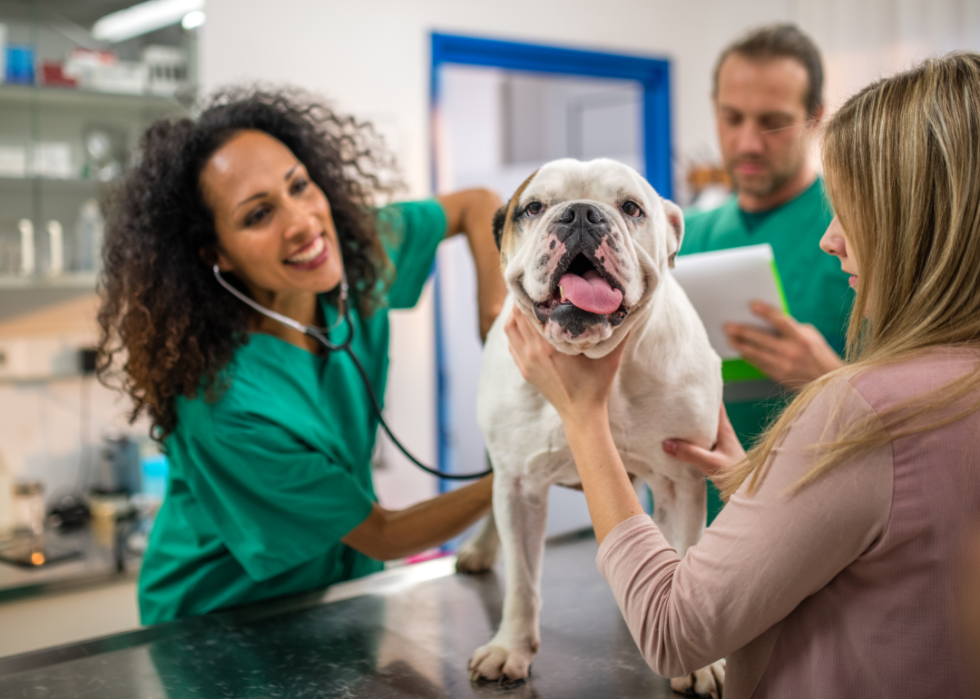
#2. Veterinarians
Public opinion of honesty and ethical standards:
- High or very high honesty and ethics: 65%
- 4-year change: data not available
Veterinarians have become a trusted fixture in many Americans' lives since the onset of the pandemic, with many Americans adopting new pets in 2020 and 2021. As regular business and travel resumed and inflation heated up in 2022 and 2023, pet shelters have reported being overwhelmed with surrendered animals.

#3. Engineers
Public opinion of honesty and ethical standards:
- High or very high honesty and ethics: 60%
- 4-year change: -6 percentage points
Engineers are prevalent in many lines of work spanning the public and private sectors. They design and build electric vehicle chargers, assemble commercial airplanes, and work on public infrastructure like bridges and roads. These professionals remain some of the most trusted, even with high-profile headlines about airplane malfunctions and collapsing infrastructure.
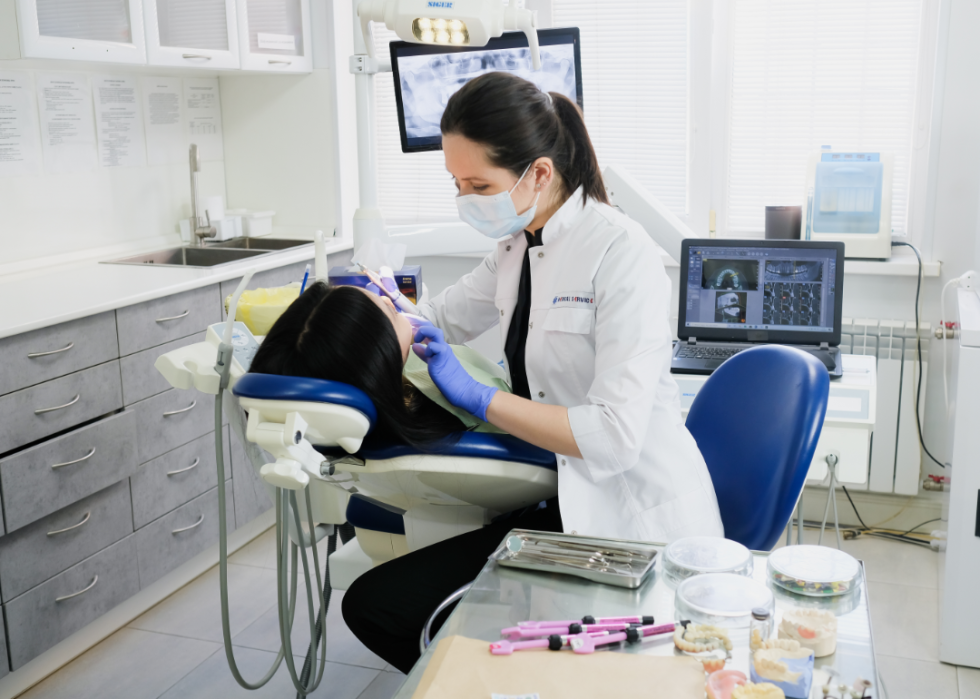
#4. Dentists
Public opinion of honesty and ethical standards:
- High or very high honesty and ethics: 59%
- 4-year change: -2 percentage points
Despite pop culture references that paint dentists as scary, these professionals enjoy more trust than their medical doctor counterparts in 2023. That view has been more or less unchanged since before the pandemic arrived in the U.S.

#5. Medical doctors
Public opinion of honesty and ethical standards:
- High or very high honesty and ethics: 56%
- 4-year change: -9 percentage points
Medical doctors' perceived honesty and ethics have suffered over the last few years despite their key role in helping people navigate the COVID-19 pandemic. As the country's health care system remains strained and the physician shortage has worsened, fewer Americans feel they can trust their doctors.

#6. Pharmacists
Public opinion of honesty and ethical standards:
- High or very high honesty and ethics: 55%
- 4-year change: -9 percentage points
Pharmacists had a difficult 2023 as retail pharmacies reported widespread understaffing. Reduced staffing means higher wait times, frustration, and fewer human interactions that build patient trust. Pharmacies have warned that being understaffed can lead to more errors.
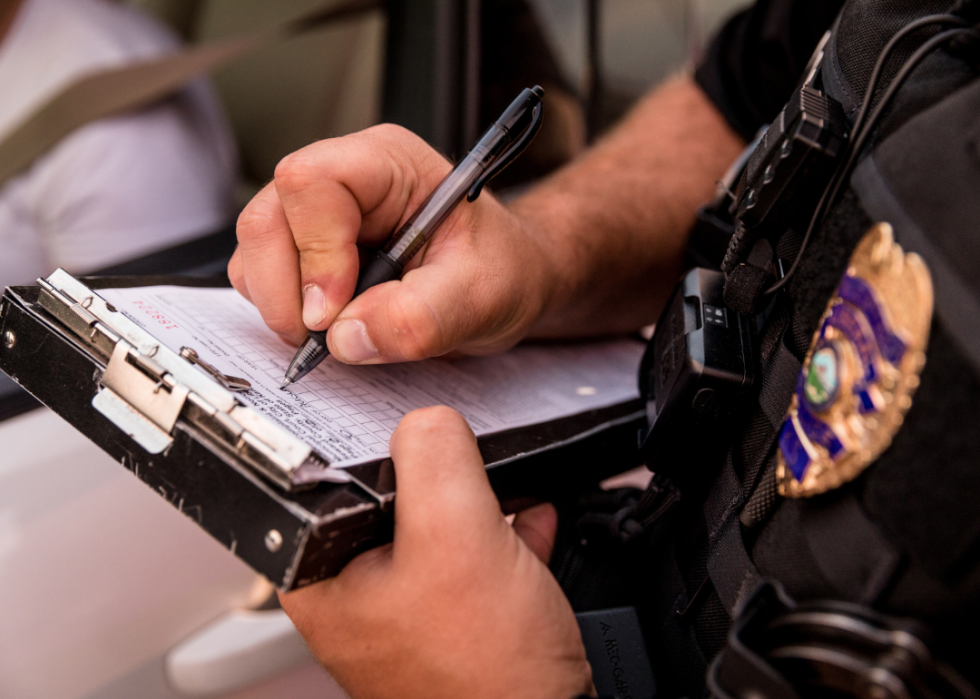
#7. Police officers
Public opinion of honesty and ethical standards:
- High or very high honesty and ethics: 45%
- 4-year change: -9 percentage points
Police officers have seen public trust decline by almost 10 percentage points since Gallup surveyed Americans in 2019. Though the trend is broad-based, other polls reveal that confidence in police differs greatly based on race.
Black Americans, who are more likely to experience police brutality than other races, have historically placed far less trust in the institution than their white counterparts. Over the last three decades of confidence polling, the gap between the portion of white adults and Black adults who trust police has tended to differ by 25 to 30 percentage points.

#8. College teachers
Public opinion of honesty and ethical standards:
- High or very high honesty and ethics: 42%
- 4-year change: -7 percentage points
Americans surveyed by Gallup who graduated from college had significantly higher trust in the honesty and ethical standards of college teachers. A majority, 51%, of college graduates thought college teachers had high or very high honesty and ethical standards, and only 36% of those who didn't graduate college felt the same way.
The role has been politicized in recent years as high-profile conservatives and right-wing pundits have leveled partisan attacks on colleges, teachers, and administrators, accusing them of forcing politics on their students.

#9. Psychiatrists
Public opinion of honesty and ethical standards:
- High or very high honesty and ethics: 36%
- 4-year change: -7 percentage points
Psychiatrists are another field where a shortage in the workforce may be related to public opinions of honesty and ethics. Mental health care is difficult to access and expensive.
Rates of anxiety and depression have risen in recent history, and the number of qualified professionals to serve those with mental illness has not kept up, according to the Association of American Medical Colleges.

#10. Chiropractors
Public opinion of honesty and ethical standards:
- High or very high honesty and ethics: 33%
- 4-year change: -8 percentage points
Chiropractors use drug- and surgery-free methods to reduce pain and discomfort, often in the back and neck. The public has long questioned the efficacy of chiropractic treatment. Though rare, serious complications of chiropractic adjustments, such as nerve compression, may contribute to waning public trust.
Studies have shown it can have a modest impact on symptoms, sometimes described as on par with using nonsteroidal anti-inflammatories like aspirin or ibuprofen.
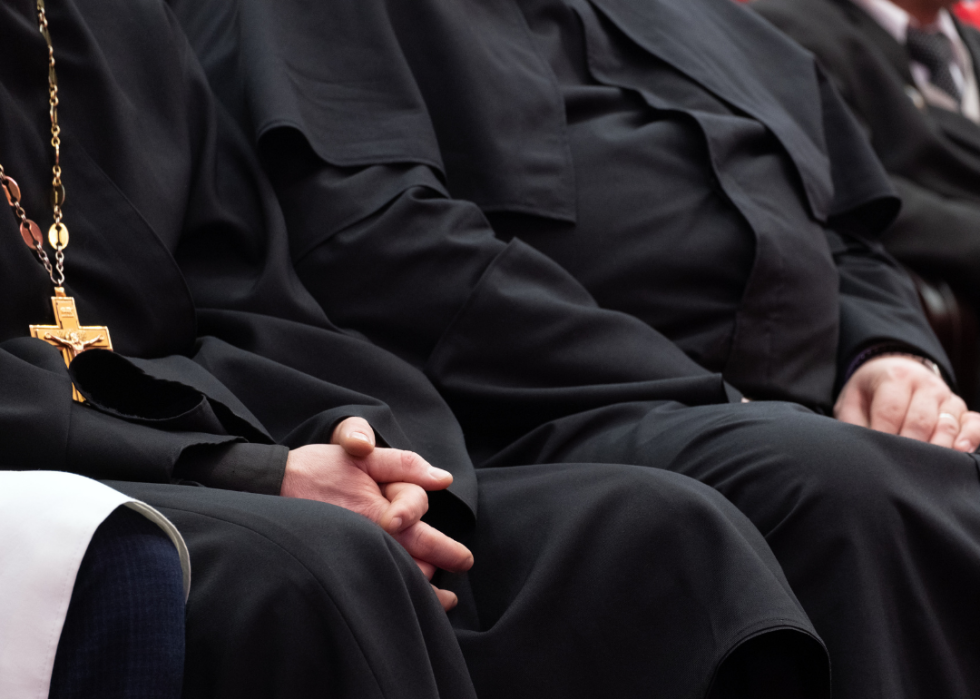
#11. Clergy
Public opinion of honesty and ethical standards:
- High or very high honesty and ethics: 32%
- 4-year change: -8 percentage points
A decline in trust in members of church clergy like pastors came on the heels of a fall in worship attendance over the pandemic years.
As tracked by Gallup, trust in this group of professionals has significantly fallen since the early 2000s as the Catholic Church has faced child abuse allegations and hard-line Christian sects have had an outsized influence over women's reproductive rights.

#12. Labor union leaders
Public opinion of honesty and ethical standards:
- High or very high honesty and ethics: 25%
- 4-year change: 1 percentage point
Despite just a fraction of Americans viewing labor union leaders as holding high or very high honesty and ethics standards, they're the only group that has seen their standing increase in the last four years. Unions have grown their representation in the previous two years through high-profile organizing drives at companies, including Starbucks and Amazon.

#13. Bankers
Public opinion of honesty and ethical standards:
- High or very high honesty and ethics: 19%
- 4-year change: -9 percentage points
Bankers saw public perceptions of their ethics decline considerably in 2023. After several years of low interest rates, Americans were refinancing their mortgages in a frenzy and frequently interfacing with financial industry workers. However, in 2023, several major bank failures may have rattled public trust in those institutions and those working there.
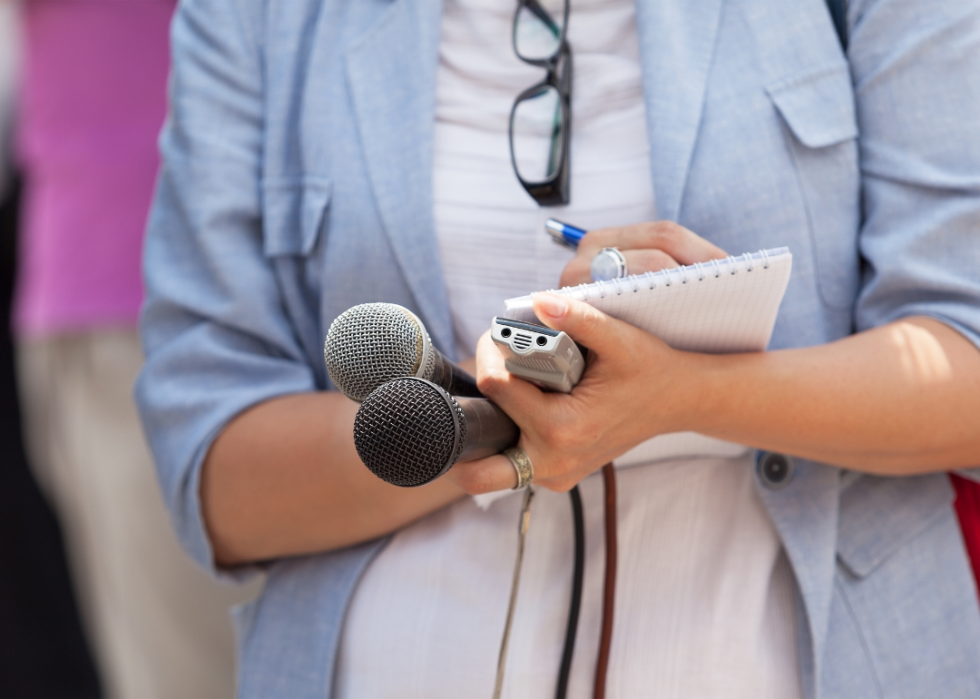
#14. Journalists
Public opinion of honesty and ethical standards:
- High or very high honesty and ethics: 19%
- 4-year change: -9 percentage points
Journalists have long been viewed as less honest and ethical than other professionals, but in 2023, their public opinion rating fell to a five-year low.
The distrust is heavily influenced by the nation's political divide and is particularly low among Americans identifying as Republicans and Independents. Conservative politicians have increasingly worked to discredit journalism critical of their actions, led by former president Donald Trump who made mocking the media a cornerstone of his 2016 campaign and presidency.

#15. Lawyers
Public opinion of honesty and ethical standards:
- High or very high honesty and ethics: 16%
- 4-year change: -6 percentage points
Lawyers interpret the law and are sworn to uphold it no matter what their client is accused of. That means even defending seemingly unscrupulous individuals in court. It's a dynamic that may influence the rather negative perception of lawyers in the public eye.
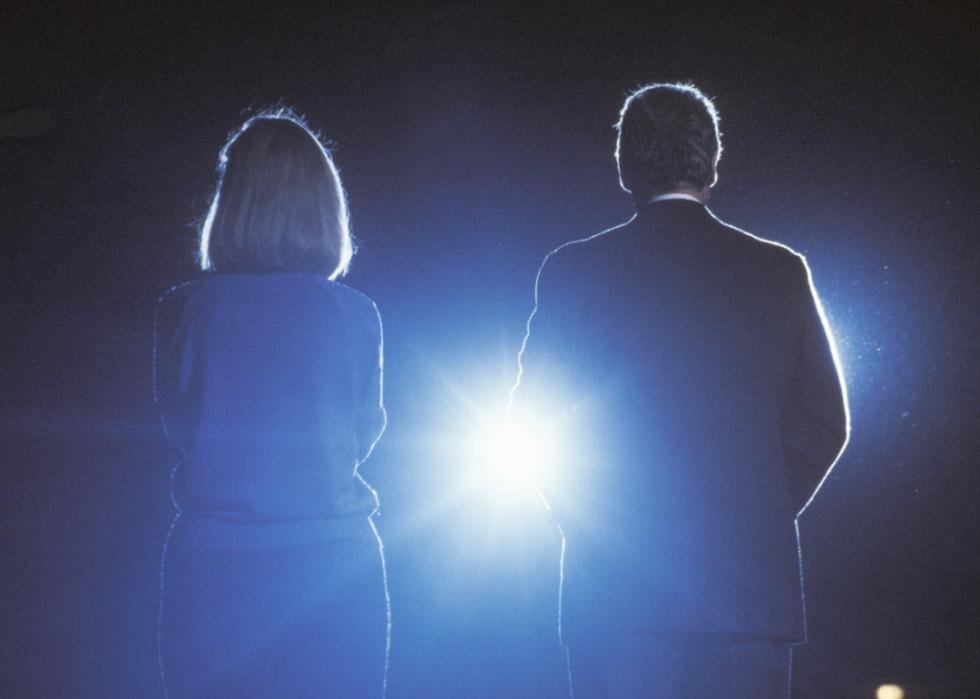
#16. State governors
Public opinion of honesty and ethical standards:
- High or very high honesty and ethics: 16%
- 4-year change: -4 percentage points
Governors lead their respective political parties at the state level, ushering through legislation they prioritize. In 2023, the American public surveyed by Gallup held their state governors in higher regard than any other political position.

#17. Business executives
Public opinion of honesty and ethical standards:
- High or very high honesty and ethics: 12%
- 4-year change: -8 percentage points
In 2023, perceptions of the honesty and ethics of business executives, along with those working in the banking industry, reached lows last seen during the 2008 financial crisis. Crushing inflation for consumers and allegations of profiteering by grocery executives and others, raising prices during and after the initial waves of pandemic infection, defined 2022 and 2023.

#18. Insurance salespeople
Public opinion of honesty and ethical standards:
- High or very high honesty and ethics: 12%
- 4-year change: -1 percentage point
Public opinion of insurance salespeople's ethics and honesty remained relatively unchanged this year compared to pre-pandemic polls. That's while insurance rates have risen as much as 20% in some cases—as they have for car insurance this past year, according to BLS data.

#19. Stockbrokers
Public opinion of honesty and ethical standards:
- High or very high honesty and ethics: 12%
- 4-year change: -2 percentage points
Perceptions of stockbrokers are also at the same levels they were during the Great Recession. The stock market had a dismal year in 2022. It only began to make some strides toward returning value to shareholders in 2023, driven by excitement about novel forms of software automation, often referred to as AI.

#20. Advertising practitioners
Public opinion of honesty and ethical standards:
- High or very high honesty and ethics: 8%
- 4-year change: -5 percentage points
Targeted advertising has only improved in recent years, and there have been numerous instances when sensitive information and data on personal habits collected by corporations leaked to bad actors. Ads are also becoming more prevalent on widely used streaming services as companies look to boost profits.

#21. Car salespeople
Public opinion of honesty and ethical standards:
- High or very high honesty and ethics: 8%
- 4-year change: -1 percentage point
Car salespeople, already among the least-trusted professionals in the country, have more or less been viewed with the same regard in 2023 as before the pandemic. The car buying and selling experience changed dramatically in 2021 as vehicle inventory bottomed out and prices skyrocketed.
Today, Kelley Blue Book says it's a buyer's market again as inventory has rebounded and prices are falling on new and used car lots.
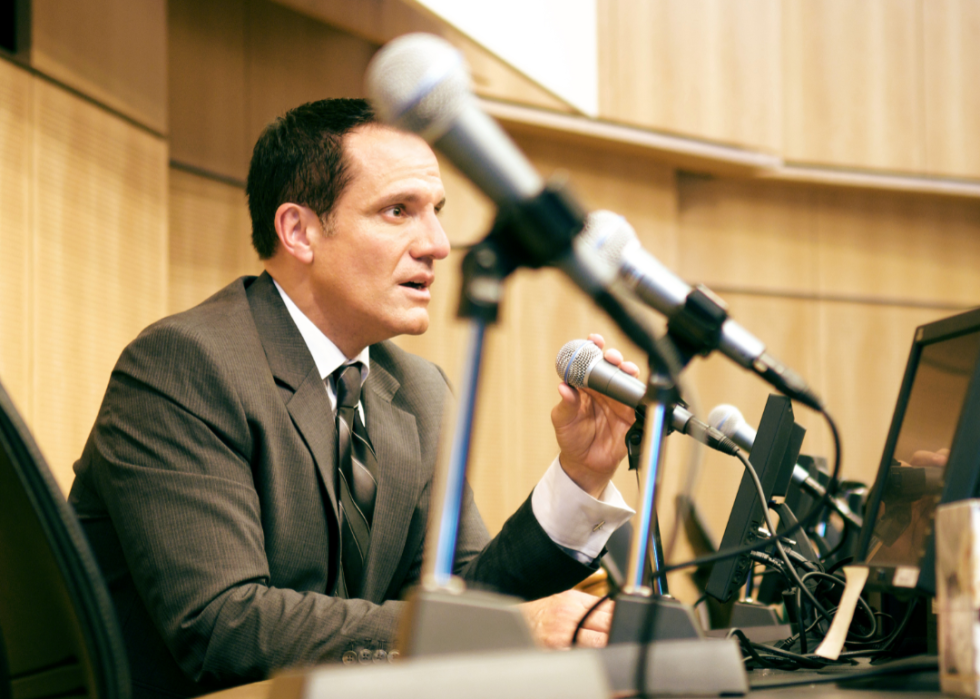
#22. Senators
Public opinion of honesty and ethical standards:
- High or very high honesty and ethics: 8%
- 4-year change: -5 percentage points
State senators are regarded as about as ethical and honest as car salespeople by the Americans surveyed by Gallup in 2023. It's the profession's lowest rating in at least the last 15 years of the survey.
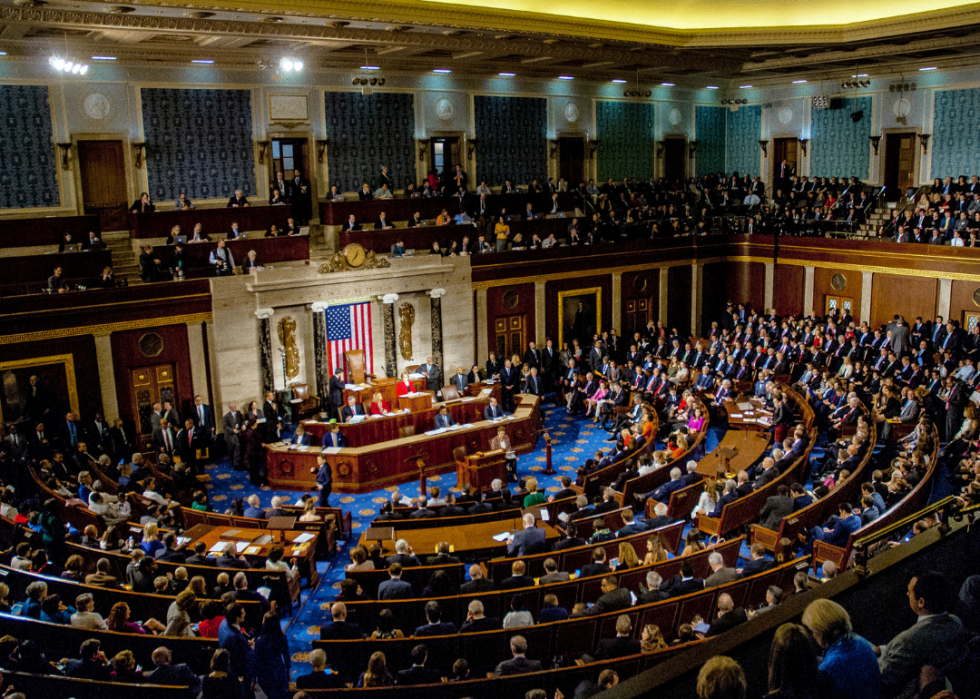
#23. Members of Congress
Public opinion of honesty and ethical standards:
- High or very high honesty and ethics: 6%
- 4-year change: -6 percentage points
Members of Congress are the least trusted individuals of all the professions surveyed by Gallup—even less than local government officials. Concerns that they don't care about their constituents or do enough to distinguish their personal financial interests from their work are among the many problems the public sees among their congressional representatives.
Story editing by Alizah Salario. Copy editing by Kristen Wegrzyn. Photo selection by Michael Flocker.



